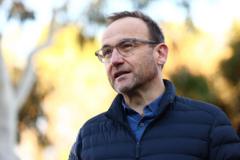This article reflects on the extraordinary life and legacy of José Mujica, whose presidency marked significant social reforms in Uruguay and garnered international admiration for his simplicity and authenticity.
José Mujica, Iconic Former President of Uruguay, Passes Away at 89

José Mujica, Iconic Former President of Uruguay, Passes Away at 89
Eighty-nine-year-old José Mujica, celebrated for his humble lifestyle as "the world's poorest president," has died after a battle with cancer.
Former Uruguayan President José Mujica, affectionately known as "Pepe," has died at the age of 89. His passing was confirmed by current President Yamandú Orsi via social media, expressing gratitude for Mujica's contributions and love for the Uruguayan people. The cause of death has not been disclosed, although Mujica had previously been diagnosed with oesophageal cancer.
Mujica, who served as president from 2010 to 2015, is renowned for his unpretentious lifestyle, standing in stark contrast to typical political figures. His stance against consumerism and promotion of progressive social reforms, including Uruguay's move to legalize recreational marijuana, catapulted him to international fame.
Despite Uruguay being a small nation of just 3.4 million, Mujica's political journey is characterized by a complex legacy that sparked both admiration and controversy. Raised in a middle-class household in Montevideo, he developed an early passion for politics. His journey began in the 1960s as a founding member of the Tupamaros National Liberation Movement (MLN-T), an urban guerrilla group advocating against perceived governmental oppression.
During his tumultuous tenure with MLN-T, Mujica was captured multiple times and endured significant trauma, including being shot six times in 1970. His perseverance led to several prison escapes and ultimately his release in 1985, coinciding with Uruguay's restoration of democracy.
Transitioning from guerrilla warfare to political leadership, Mujica began his political career in the Uruguayan legislature before ascending to the presidency in 2010, amidst a wave of leftist leaders across Latin America. His administration saw impressive economic growth, with an annual average of 5.4%, and he was celebrated for enacting landmark laws, including those supporting abortion rights, same-sex marriage, and marijuana regulation.
Known for rejecting the presidential mansion, Mujica continued living modestly with his wife, former guerrilla Lucía Topolansky, in their simple home. He frequently drove his old Volkswagen Beetle and donated a large portion of his salary to those in need, earning him the title of "the world's poorest president"—a label he humbly disputed.
Despite his promotion of austerity, Mujica's government occasionally faced criticism for escalating public spending and failing to resolve issues in the education sector. Yet, his administration was largely free from corruption controversies, and he enjoyed high popularity, with approval ratings nearing 70% towards the end of his term.
After retiring from politics in 2020, Mujica remained a prominent figure in Uruguay until his death. His political heir, Yamandú Orsi, was elected president and holds a vital role in continuing Mujica's vision for social reform. Mujica's approach to life was characterized by acceptance of death as a natural part of existence, often reflecting philosophically on the essence of life. His profound impact on both his nation and the broader conversation about leadership and authenticity will be remembered for years to come.






















